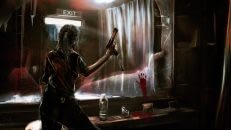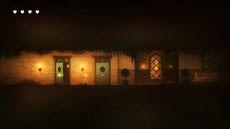Pixel Heroes: Byte & Magic Review – I Love it When a Plan Comes Together
Some games are difficult because they challenge your reflexes. Others present challenges akin to a game of chess, asking players to plan their moves carefully and strategically, predicting and defeating their opponent’s maneuvers. So, when I say that The Bitfather’s Pixel Heroes: Byte & Magic is relentlessly hard, slaughtering me in the first dungeon, I mean it in more of the chess style. You have to have a good plan to keep your party members alive, weighing your available moves as your enemies press in on you. With a solid plan, you just might make it through your first dungeon. Keep in mind, though, that the game’s base difficulty is Hard, only getting more difficult from there.
Pixel Heroes: Byte & Magic is a stripped down RPG, playing on a 2D plane that takes out a lot of the wandering from the genre. You can move through a few central locations around town, buying items or asking the townsfolk about quests. Once you’ve picked up a quest, leaving town puts players on a walk to the dungeon in a straight line, before taking a singular path through the dungeon.
Worried this sounds like a Final Fantasy XIII “no exploring” kind of dull? Pixel Heroes: Byte & Magic enhances the straightforward march by adding in random encounters, and not just the combat kind. While on the road to a dungeon, a number off odd things can happen to players. I ran into a cultist with literature, a mushroom that didn’t appreciate being picked, a bee’s nest that I was too scared to kick, and a group of hobbits who wanted me to hold onto a ring for them. Most of these little run-ins are funny, playing on genre tropes for a few genuine laughs, each presenting the player with options for what to do. Choosing wrong (or right, if you want experience) means getting into a fight. The strangest options will lead you to leave or fight, though, so it can be thrilling to try to figure out which dialogue option will give you the outcome you’d like.
The game also randomizes an available crew of adventurers at the inn where players start the game, letting the player choose three of the six people bumming around. Each has a detailed description of their strengths and stats, as well as some silly reasons for why they have them. A barbarian might have a high strength stat from lifting something heavy that morning, and things like that. It made going through menus less of a chore, which is important considering you’ll likely find yourself back at the inn often; if your whole party dies in a dungeon, your save gets wiped.
There is a large variety of characters and abilities though, so each trip to the inn was fun. I never settled on any one party style since the stats and people were so varied. I had a tough-as-nails dwarf on my first run, but ended up having to use a weaker barbarian I met on my second, since no one had his exact same skills and abilities. They do tend to fall into melee/healer/caster classes, though, so it’s easy to find something that suits your playstyle. Still, the shifting, random variety meant I had to come up with different combat tactics every time I built a new team.
Once you’ve settled on a team and brought them out to the dungeon, there’s no turning back. You have to complete the walk to the dungeon, the dungeon itself, and the trip back without losing everyone. You can revive individual party members at the church if you make it back, but in my experience, once one person drops it’s very hard to make it back home again. You can save at any time, but don’t hope to abuse reloading to redo a bad fight. The game saves over your old file every time you make a move. I tried to do that myself after exploding my poor barbarian on a booby-trapped treasure chest. It didn’t work, leaving my healer and warrior to wander alone. They didn’t last long after that.
Combat is simple to execute, but planning moves in advance is what will keep players alive. Both your party and the enemy forces meet on a straight line, taking turns attacking back and forth between each other. You have as much time as you need to pick your move, but keep in mind that for every attack made, you need a turn to rest. For instance, you will not be able to spam a healer if you let your health get too low. Also, each character has two unique powerful attacks that either hit more enemies, hit harder, or attack at farther ranges. These require many turns to recharge, and using these at the right time makes a huge difference in your chances for survival.
Status effects are a big part of Pixel Heroes: Byte & Magic. Beyond the usual poison and paralysis, there is also infestation, bleeding, on fire, and other fun ailments. These stack, and almost every dungeon has a theme affliction it uses like crazy. In some RPGs you can ignore stat ailments a bit, but you really can’t do so here. Your healer gets too few chances to heal, and wasting a healing round on curing party status ailments (which can be done with one basic spell) often means not being able to cast a big healing spell for several turns.
To help deal with status effects, much of the game’s extensive equipment stockpiles have protection against certain ailments. Again, planning ahead is your friend in Pixel Heroes: Byte & Magic. You need to watch what the enemies cast, using the break you get between dungeon rooms to equip your party with the right gear to protect yourself from it. You have a limited amount of room in your inventory, but you can always throw away what you don’t need in the dungeon, as the enemies drop tons of loot upon defeat. Much to my delight, any party member can equip any piece of equipment, so there’s no worrying about putting the right kind of hat on a healer.
That being said, a lot of this planning can result in some severe rage when your whole party dies. Choosing a party, planning their best attack methods together, and keeping them properly equipped is very time consuming, so to lose all of that work with no hope of fixing it can be pretty frustrating. But it didn’t bother me all that much, as it gave me an excuse to try new party builds, and it also felt really, really good to just beat the first dungeon. There is a large time investment to sink into for those looking to beat the game, and you need to be patient enough to start from scratch multiple times to enjoy it.
The randomized dungeons make repeat deaths a little easier to take. The game randomly chooses dungeon order, skewing enemy difficulty to suit your level, so you won’t be stuck losing in the same dungeon over and over while you learn the ropes. The pixel art, while stuck only showing a simple background behind enemies in each dungeon, still manages to be varied enough in each dungeon that it’s appealing to look at. It’s very simple, but it works.
The enemies and players have quite a bit of variety as well. Party members looked wildly different as I looked through them, which made constantly replacing my dead party members a lot more fun. Enemies can be quite simplistic at times, but small stylistic details and pixel positions can give them some interesting character. There are also some new types of enemies and combat styles for them that add even more variety to the game’s visuals, giving it a nice appeal even though it looks quite simple at a glance.
The music in the game can be a little repetitive and simplistic, but it does have a nice ring to it. The traveling music gives a strong sense of being out on an adventure, and I did like a couple of the other tracks in the game. The battle music drones a bit and can get irritating, but I was usually too caught up in keeping my party alive to notice it. Overall, the music is serviceable and suits the game well, but it’s not spectacular.
Your interest in building a strategy and accepting when it fails will directly tie into how much you can enjoy Pixel Heroes: Byte & Magic. It feels great when a plan comes together, but more often than not, it won’t, meaning you’ll be starting from scratch again. Those snatched victories are hard to turn down, though, and as frustrated as I should have been when I lost, I knew it was my own fault for being either greedy or careless. If you think your strategies can beat the high difficulty of The Bitfather’s Pixel Heroes: Byte & Magic, you should definitely play it. Tough but fair, its humor and challenges kept me coming back no matter how many adventurers died.
Pixel Heroes: Byte & Magic is available for $9.99 on Steam (Temporarily %15 off that price right now). For more information on The Bitfather or their game, you can follow them on IndieDB, Facebook, and Twitter.






